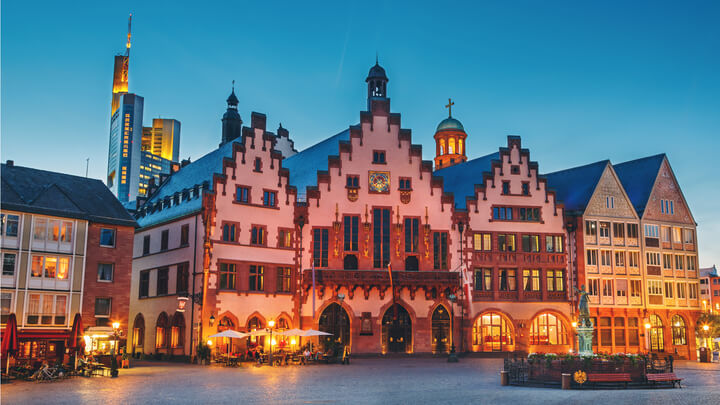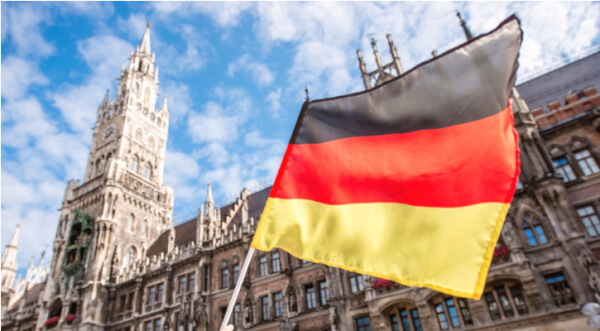Having a baby in Germany? You'll wanna know the costs
Are you or your partner expecting? While this is meant to be a very exciting time in your life, sometimes medical expenses and navigating public or private...

As the largest national economy in Europe - and one of the biggest in the world - it's no surprise that many expats are proud to call Germany home. Cosmopolitan cities and a varied and vibrant cultural life only add to the appeal.
If you're considering a move to Germany and want to work while you're there, you might need a work visa. Although making a move can be daunting, the process of getting a work visa is fairly straightforward. Check out this guide to help you get your German work visa organised.
Your first priority should be to figure out if you need a work permit at all. In some cases, depending on your nationality and the role you’re going to take on, a permit might not be necessary.
As Germany is an EU member state, it's not necessary for nationals of other EU countries, Switzerland, Norway, Iceland or Liechtenstein to have a work permit. Other special circumstances may also apply. For example, you may not need a visa if you're a teacher, research assistant or engaged in scientific or technology work. This helpful tool from the Federal Employment Agency can help you decide if you need a work permit if you're unsure.
The process for getting a German work visa is clearly set out on the German government website. More useful information can be found at the European Commission mobility portal, EURES, and the EU Immigration Portal.
The government backed Make it in Germany Website and your local German embassy are also excellent sources of information about the visa process. You can also take a look at this helpful document which helps to layout the processes you’ll need to take.
In general for your work permit to be issued your employer must show that they could not find a ‘preferential candidate’ - meaning someone suitably qualified from Germany or another EU country. However, if you're coming to Germany to do a shortage job (on the ‘whitelist’)
Work permits are issued in different categories depending on whether you're entering the country for general employment, as a skilled specialist or as an entrepreneur.
To get a work permit for Germany you must apply first at your local German diplomatic office. The cost at this stage will be the equivalent of € 60 in your local currency.
The processing time varies and might take a few weeks. If your application is successful you’ll be granted a short term visa of up to three months thus allowing you to enter Germany and complete the residence and work visa process there.
To finish up your application, you must make an appointment with the foreign nationals registration authority once you arrive in Germany to apply for a work and residence permit.
Assuming there are no bars to your entry (such as previous criminal convictions), you can then get your visa to work and live in Germany, which might be specified, for example, as a visa for skilled work or highly qualified foreigners. You'll also need to pay additional fees of up to € 260 to receive your paperwork.
Depending on the type of work you're planning on doing it might be possible to apply for an EU Blue Card instead of a German work visa. Similar to the US Green Card, this document gives you the right to work across most EU member states (excluding Denmark, Ireland and the UK). To be eligible for a Blue Card, you must be from a country outside the EU, be highly skilled (typically meaning you have completed a bachelor's level university degree or have five years of senior professional experience) and have a binding job offer or active work contract.
The Blue Card application process is fast tracked by member states, meaning it's typically quicker than other forms of work visa application. However, it may still take up to three months. Although you start the application process online and through a single point of contact, the process may vary depending on your personal circumstances. The Blue Card network has a good website and offers support to applicants to help them understand the process.
For your initial application to be progressed at your local embassy, you'll need a confirmed job offer and proof of your qualifications. Remember to check the exact additional requirements with your local embassy - the following are commonly required:
Once you arrive in Germany and have arranged a meeting with the foreign nationals registration authority, you'll also need to present:
The process for applying for a work visa for seasonal work in Germany is the same as for a permanent position.
If you wish to work as an au pair, you must be under the age of 26 as well as have a written offer of employment, and fulfil all the requirements of a general employment visa.
If you're under 30, and a citizen of Australia, New Zealand, Israel or Japan, you may be able to get a working holiday visa. Under some circumstances Canadian and Korean nationals may also be entitled to apply for this visa type, which is valid for a year and allows you to work during your stay. It’s not necessary to have an employer contract or letter for this type of visa, and there are no limits on the type of work you can do.
If you're in Germany with a student visa you're entitled to work up to a maximum of 120 days a year (or the equivalent). After you graduate you may be able to extend your visa while you seek a permanent job related to your qualification, although you will then need to submit a new working visa application to cover your new role.
If you intend to work for yourself you'll need to apply for a visa on the grounds of self employment. The process and documents required is the same as for other visa types, with an additional requirement being that you must prove your work will benefit Germany. If you're investing more than € 1 million or creating ten or more jobs, then this obligation is automatically satisfied. If not you'll need to prove your case at application, providing a business plan, projection, and proof of your capabilities.
To get a self employment visa you must show how you will fund your business, and if over 45, you'll need to show you have a pension plan in place.
Once you have a visa and residence permit you can apply for your family to join you under the family reunification scheme. The eligibility requirements will depend on the type of visa you have.
Holders of the EU Blue Card are able to apply for visas on behalf of family members without a waiting period under the family reunification scheme. In this case - or if you have a visa as a highly qualified professional - the requirement for your family to speak German might be waived. Otherwise, basic German is usually mandatory for family members looking to get German residence permits.
Moving to a new country is an exciting process, but can involve a good deal of planning and preparation. Get your work visa arranged ahead of time, so you have one less thing to worry about.
How can I move money to Germany from my bank account abroad?
To get the most of your money in Germany, you'll want to open a bank account in Germany, which you can do before you arrive.
Once you send money either to or from Germany, consider using a money conversion service like Wise to avoid unfair exchange rates. There's a small transparent fee, and when your money is converted from one currency to another you’ll get the real exchange rate - the same one you can find on Google. Not only that, but Wise receives and sends money via local bank transfers instead of internationally, further saving you money by cutting out hefty international transfer fees.
If your trip is short or opening a bank account in Germany isn't an option, you can always withdraw money from your foreign account using an ATM in Germany. Just keep in mind it'll be more favourable to agree to be charged in the local currency, not your home currency.
Regardless of when you start your new job abroad, it should be fairly straightforward to get yourself a visa if you follow the right steps. The most important part is just to make sure to enjoy your new adventure.
*Please see terms of use and product availability for your region or visit Wise fees and pricing for the most up to date pricing and fee information.
This publication is provided for general information purposes and does not constitute legal, tax or other professional advice from Wise Payments Limited or its subsidiaries and its affiliates, and it is not intended as a substitute for obtaining advice from a financial advisor or any other professional.
We make no representations, warranties or guarantees, whether expressed or implied, that the content in the publication is accurate, complete or up to date.

Are you or your partner expecting? While this is meant to be a very exciting time in your life, sometimes medical expenses and navigating public or private...

Holidays in Germany are celebrated differently than in many parts of the world. Germans take their holidays very seriously, with celebrations that are steeped...

Germany is so much more than sausages and beer. The country boasts incredibly low unemployment, a high quality of life, and a wonderful mix of history,...

Germany is already home to a healthy expat community and a thriving tourism industry. People from all over the world regularly visit or relocate to Germany,...

If you’re moving to Germany, one of the first things you’ll have to consider is how you’ll get around. While local trips are often taken by bicycle or on...

Germany is a wonderful place to make a home, and is well known for having welcomed many migrants in recent years. However, its citizenship laws are actually...